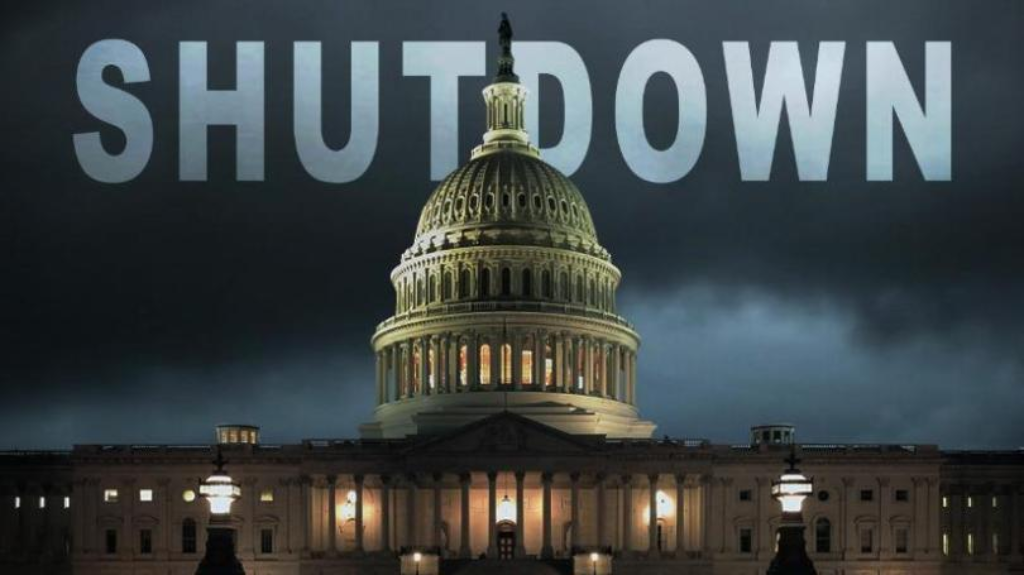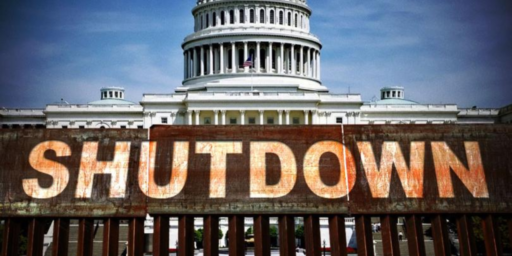It’s Time To Make Government Shutdowns Impossible
There's a way that Congress and the President could make future government shutdowns impossible, but they probably won't do it.

With the government shutdown entering its thirty-third day, some in Washington are talking about changing the law to make shutdowns impossible going forward, a proposal that makes more sense the longer this ordeal goes on:
With the partial federal shutdown having entered its second month and no resolution in sight, a Democratic senator is introducing a bill that he says would prevent such crises in the future.
The name of the bill: the Stop STUPIDITY Act.
The measure, introduced Tuesday by Sen. Mark R. Warner (D-Va.), would automatically keep all of the federal government running in the case of a future funding standoff — with the exceptions of the legislative branch and the Executive Office of the President.
“The Stop STUPIDITY Act takes the aggressive but necessary step of forcing the president and Congress to do the jobs they were elected to do,” Warner said in a statement. “Workers, business owners and tax payers are currently paying the price of D.C. gridlock and my legislation will put an end to that.”
The full name of Warner’s measure is the “Stop Shutdowns Transferring Unnecessary Pain and Inflicting Damage in the Coming Years Act” — a moniker that, some astute Congress watchers pointed out, actually results in the acronym “Stop STUPIDITCY Act.”
The Washington Post’s Aaron Blake writes about Warner’s proposal, as well as another proposal from Kentucky Senator Rand Paul:
Hundreds of thousands of federal workers will soon go without their second paycheck this month, as the 32-day shutdown drags on with no end in sight. But if there’s a silver lining for them, it might be this: The messier this gets, the more momentum there could be for a mechanism to effectively outlaw future shutdowns.
Sen. Mark R. Warner (D-Va.) on Tuesday introduced a bill called the Stop STUPIDITY Act. In the event of a lapse in government funding, the act would reinstate funding levels from the previous fiscal year — except for Congress and the office of the president, which would not receive funding until they reached an agreement.
Warner’s Republican colleague Sen. Rand Paul (Ky.) reintroduced his own proposal last week. Rather than shut down the government in the absence of a budget, it would institute an across-the-board 1 percent funding cut for all agencies and would cut another 1 percent every 90 days that no agreement is reached.
Lawmakers introduce bills all the time, and there’s little reason to believe that either of these plans will pass or even earn a vote. But if there were ever an environment conducive to such a bill, this could be it.
One of the dirty little secrets of the shutdown is that it’s not even a fight Republicans particularly desired. In fact, the GOP-controlled Senate passed a regular government funding bill via unanimous voice vote last month, before President Trump changed his mind and insisted on money for a border wall. Republicans largely have stood behind Trump, but they seem to be tolerating him more than cheering his strategy.
It’s a strategy they could pay a price for. Polling shows that a majority of Americans blame the GOP and Trump for the shutdown. Republicans seem to be jammed between that political reality and their deathly aversion to angering the president. Senate Republicans could try to end the shutdown by passing a clean government funding bill, but doing so would come at a significant cost to the president’s political capital.
Democrats would probably support such a proposal, given that shutdowns tend to be a weapon used by Republicans. Democrats did force a brief shutdown last year, over the Deferred Action for Childhood Arrivals program, but the last big one came in 2013, when Republicans tried to defund Obamacare. The last lengthy shutdown before that came in the mid-1990s, when Republicans insisted that President Bill Clinton balance the budget with specific estimates.
None of these shutdowns really worked, which is another argument for taking the option off the table.
All of this brings to mind the fact that government shutdowns amid funding lapses are, in some sense, a relatively recent phenomenon. Prior to 1980, there were several occasions when the government fell short on passing a budget by the time required by law. During the Ford Administration, for example, there was funding lapse in 1976 that lasted 12 days. Under President Carter, there were a total of four funding lapses that lasted a total of 28 days over the course of four years. (Source) None of these lapses resulted in government shutdowns, though. Government workers continued to work and, as far as I have been able to determine continued to be paid, as did other Federal obligations. That changed in 1980 when President Carter asked his Justice Department for a legal opinion on this issue, which involved the interaction of two laws, the Budget Control Act of 1974 and the Anti-deficiency Act. The first law established the basic outlines of the budget and spending procedures that we have followed and made changes that were designed to address perceived abuses by the Nixon Administration when it came to allocating government spending. With some revisions unimportant to this discussion, this law continues to govern the budget process to this day. The second law, which has existed in one form or another since the late 19th Century, basically prohibits the Federal Government from spending money not specifically allocated. In that legal opinion, then-Attorney General Benjamin Civiletti determined that the two laws required that all Federal Government work must cease in the event of a shutdown and that no funds not specifically allocated could be paid, including salaries and payments to government contractors. In an updated opinion handed down later, Civiletti determined that government services deemed “essential” could continue, but workers covered under that category could not get paid until a funding bill was passed. (Sources here and here.)
If it wanted to, Congress could pass legislation that would essentially return us to the pre-1980 status quo by providing that, in the event of a failure to pass a spending bill by a set deadline, funding of the relevant government agencies would continue until the new budget was passed and put into effect. This would end entirely the idea of the distinction between “essential” and “non-essential” government functions, end the furloughs of Federal employees during these funding lapses, and guarantee that all Federal workers and contractors would continue to get paid as provided under the previously existing budget. This would end the absurdity of government shutdowns and would take away the ability of either party in Congress or the President to hold the government hostage over unrelated policy issues, as occurred in 2013 and as we’re seeing unfold today. The proposals from Senators Warner and Paul come close to this idea, but unfortunately, neither one of them is not likely to get very far. Perhaps once we get passed this current shutdown, though, Congress and the President will realize just how insane what we’re going through now actually is and take some action to make it less likely in the future.






How about this: If the budget is not passed by the deadline, all members of congress stop receiving their pay. No other legislation, committee work, conformation hearings, or any other business can take place other then work on the budget agreement. All travel for all elected officials in all branches is curtailed. then you can throw on your 1% cuts. That might sharpen their minds a little bit
Government functions continue as an automatic CR.
@Rick DeMent:
This would appear to be barred by the 27th Amendment.
@Doug Mataconis:
INAL, but wouldn’t holding congressional pay still be possible as long as compensation levels are not changed? That reading would seem both consistent with the letter and the intent of the 27th.
My experience is that incentives really make all the difference. Putting the cost of failure to fund the government on those accountable for appropriations is what will change this pattern of extortion. Rand Paul’s bill, OTOH, would only encourage further shutdowns, if you consider the incentives. Republicans would prefer 1% across the board cuts as a matter of policy, so it would seems Paul’s bill is designed to better design shutdowns to maximize the cost to Democratic should they not give the Republicans everything they ask for.
@Doug Mataconis:
Not if the law passed in a prior session, no?
Law says that in the event of shutdown, Congresscritters gets no pay. Passes in 2019. New Congress in January 2021. Government shuts down. Congresscritters get no pay. No 27th Amendment violation because law that varied their pay passed in prior Congress.
‘course, they will never pass it but…
@Doug Mataconis: Could this perhaps be avoided by simply marking the pay “deferred?” The compensation doesn’t change, only the payday.
That would bring it in line with what’s currently being inflicted on federal workers.
@Doug Mataconis:
They could write around it, they would get back pay just not until the fuss was over.
This doesn’t require a law to fix. Note that between 1974 and 1980 there were several funding lapses that did not result in shutdowns; funding just continued at existing levels until the lapse ended.
What changed in 1980? Carter’s attorney general Civiletti released an opinion that lapses required a shutdown.
WHICH MEANS ALL WE NEED TO DO IS HAVE THE CURRENT AG RESCIND THAT OPINION.
@Stormy Dragon: I believe the Anti-Deficiency Act would also require repeal.
Friendly reminder:
This is what happens when you give most of the levers of power in our system of government – House, Senate, White House – to a political party that has very little interest in governing, that believes that the great majority of federal employees could be fired and their positions not filled and we would all be better off.
It’s not hard to imagine that many Republicans (the Trump base) see a different end game than getting a Wall for Trump. Some probably figure that that as this goes on (and on and on and on) there’s no downside, the elections are past, and 202o is way out there. This is a Trump base wet dream.
@Mikey:
If congress can’t get a majority opinion on what the budget is, who would have standing to sue for a violation of the Anti-Deficiency Act?
I have no particular fondness for the Anti-Deficiency Act but I think a better solution would be to eliminate the omnibus spending bills and continuing resolutions entirely. That would require that something like the single subject amendment be passed.
just called the Senate and left messages for Rick Scott and Marco Rubio about ending the shutdown. The switchboard number is 202-224-3121
Between the shut down and the SOTU tiff, I’m wondering where all the adults are in Washington DC.
I’m reminded of a Pink Floyd song “The Fletcher Memorial Home”
Take all your overgrown infants away somewhere
And build them a home, a little place of their own.
The Fletcher Memorial
Home for Incurable Tyrants and Kings.
And they can appear to themselves every day
On closed circuit T.V.
To make sure they’re still real.
It’s the only connection they feel.
@Stormy Dragon: Yeah. Sounds like kind of a shaky opinion. First he decides that per the law, they can’t work, then he does backsies and says, well some of them can. I’d be OK with no one working. That would also stop shutdowns. But I don’t see the AG issuing a new opinion. First, we sortta don’t have an AG. And when Barr takes over he’ll realize that his anti-democratic party may need shutdowns to impede governance.
@Doug Mataconis: And most legislators are pretty wealthy. It wouldn’t be a great motivator.
Now, if the treasury seized their bank accounts and stock portfolios….
@Gustopher: Good idea! Alas, there is a legal principle; IICR it states that the law abhors forfeitures. I don’t think your proposal would stand very easily.
It’s kind of reasonable to note — just for the sake of conversation — that one of our two parties has actually sort of embraced the tactic of government shutdowns. And the other has not. I mean…well, I am a Democrat, I admit that…but still, worth noting. Maybe consider that small fact when thinking of how to vote next time the polls open. And every FRIGGING time thereafter.
Jus sayin…
@Dave Schuler:
A quick google failed to find any proposed operational tests for what constitutes “a single subject”. Without such a bright line, the amendment would be unenforceable. And it’s hard to imagine any nontrivial test that would not be susceptible to the argument that “how should the government spend money next year?” is a single subject.
@Gustopher:
You underestimate how petty Congresspersons are. I remember a shutdown that ended soon after the Congressional gym stopped providing clean towels and janitorial services.